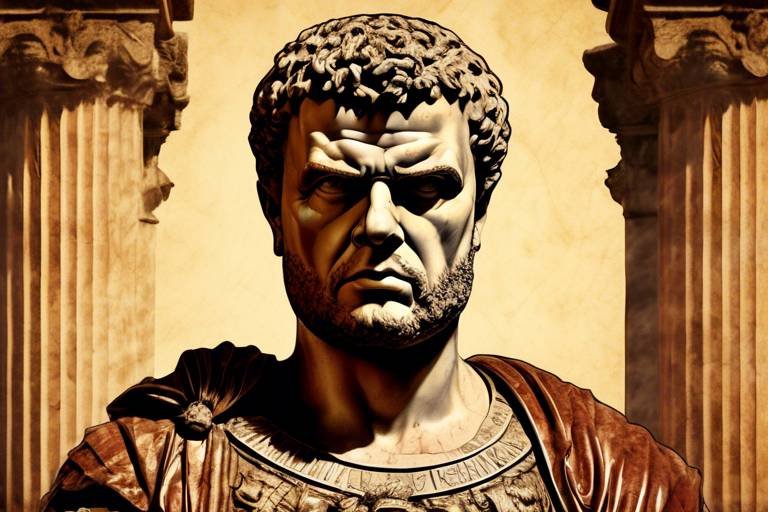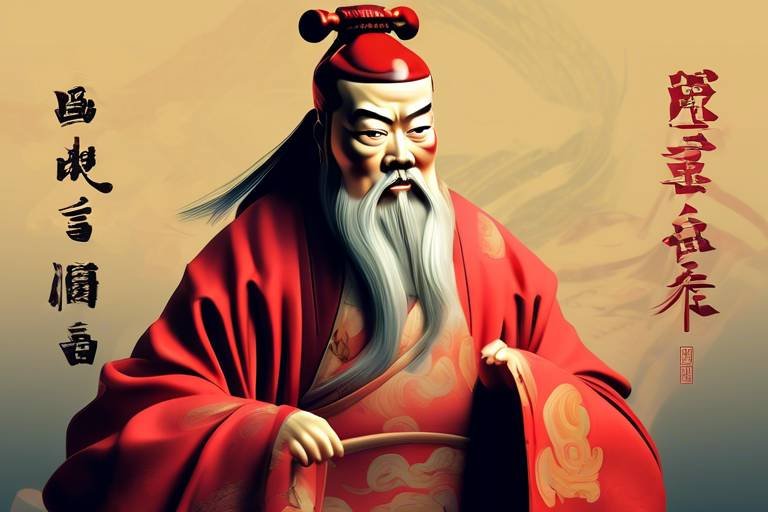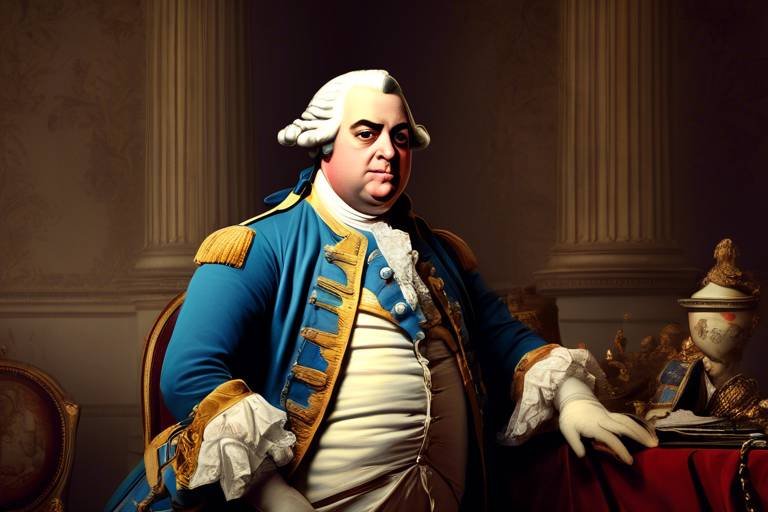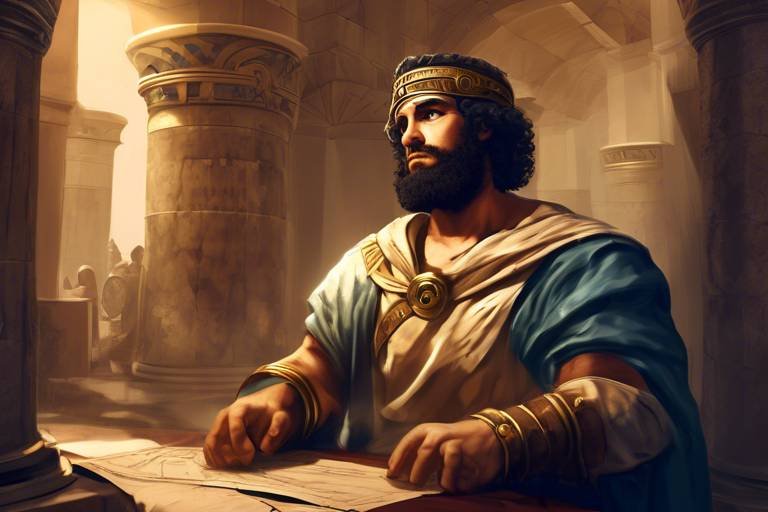Confucius: The Philosopher of Morality
Confucius, often hailed as the Philosopher of Morality, stands as a towering figure in the realm of Chinese philosophy. His profound insights into ethics and moral principles have left an indelible mark on Chinese society and beyond. Delving into the depths of his teachings unveils a world of wisdom that transcends time and resonates with the essence of human nature.

Early Life and Education
Exploring the life and teachings of Confucius, a prominent Chinese philosopher known for his moral and ethical principles that have had a lasting impact on Chinese society and beyond.
Confucius, also known as Kong Qiu, was born in 551 BC in the state of Lu, in present-day Shandong Province, China. His early life was marked by poverty and loss, as his father passed away when Confucius was only three years old. Despite these hardships, Confucius showed a strong passion for learning from a young age.
He received a traditional Chinese education, studying the Six Arts which included ritual, music, archery, charioteering, calligraphy, and arithmetic. Confucius delved deep into the teachings of ancient Chinese texts, particularly the Book of Songs and the Book of History, which laid the foundation for his philosophical beliefs.
Confucius's education was greatly influenced by the values and traditions of the Zhou dynasty, emphasizing the importance of social harmony, respect for authority, and the cultivation of personal virtue. These early experiences and teachings played a significant role in shaping Confucius's moral philosophy and ethical principles.
Q: What is the significance of Confucius's early life on his philosophical development?
A: Confucius's upbringing in a tumultuous period of Chinese history, coupled with his dedication to learning and traditional values, laid the groundwork for his profound insights into morality and ethics.
Q: How did Confucius's education influence his teachings on virtue and ethics?
A: Confucius's rigorous education in the Six Arts and study of ancient texts instilled in him a deep appreciation for ritual propriety, benevolence, and the importance of personal character, which became central tenets of his ethical framework.
Q: What role did cultural influences play in shaping Confucius's philosophical beliefs?
A: The cultural context of the Zhou dynasty, with its emphasis on social order, filial piety, and moral rectitude, profoundly influenced Confucius's views on morality and governance, leading him to advocate for ethical conduct and harmonious relationships in society.

Key Teachings on Ethics
Confucius's key teachings on ethics revolve around fundamental principles that emphasize the importance of moral behavior and personal virtue in creating a harmonious society. One of the central concepts in Confucian ethics is the idea of filial piety, which highlights the respect and obedience that individuals should show towards their parents and ancestors. This concept underscores the significance of family relationships and the role they play in shaping an individual's character and moral values.
Another key teaching of Confucius is the principle of righteousness, which emphasizes the importance of acting in accordance with moral principles and upholding justice in all interactions. Confucius believed that individuals should strive to cultivate a sense of integrity and fairness in their actions, contributing to the overall well-being of society.
Furthermore, Confucius emphasized the cultivation of personal character as a crucial aspect of ethical behavior. He believed that individuals should focus on self-improvement and the development of virtuous qualities such as honesty, sincerity, and humility. By nurturing these qualities within themselves, individuals can contribute positively to the moral fabric of society.

The Five Relationships
Confucius's philosophy emphasizes the importance of harmonious relationships within society, encapsulated in his concept of 'The Five Relationships.' These relationships define the interactions between individuals and underscore the ethical values that guide social harmony and personal conduct. Each relationship is based on mutual respect, duty, and responsibility, reflecting Confucius's belief in the interconnectedness of human interactions.
The first relationship in Confucius's framework is that of ruler and subject. Here, the ruler is expected to govern with benevolence and wisdom, while the subject must show loyalty and obedience. This relationship highlights the significance of good governance and the duty of the governed to support and respect their leaders.
The second relationship is between father and son, emphasizing filial piety and respect for parental authority. Confucius believed that honoring one's parents was fundamental to cultivating moral character and maintaining family harmony. This relationship forms the foundation of social order and familial values.
The husband-wife relationship is the third aspect of 'The Five Relationships,' emphasizing mutual love, respect, and fidelity. Confucius stressed the importance of marital harmony and the roles of husband and wife in supporting and complementing each other within the family unit.
Next, the relationship between older and younger siblings underscores the importance of sibling harmony and mutual support. Confucius believed that siblings should display affection, loyalty, and cooperation, fostering strong bonds within the family and promoting unity.
The final relationship in Confucius's framework is that between friends, emphasizing trust, loyalty, and mutual understanding. While not based on hierarchical roles like the other relationships, the friendship bond was seen as essential for personal growth, emotional support, and moral development.
Overall, 'The Five Relationships' in Confucian philosophy serve as a moral compass for guiding individuals in their interactions with others, promoting social cohesion, ethical conduct, and the cultivation of virtuous character.

Li and Ren: Moral Virtues
Confucius, the revered Chinese philosopher, placed great emphasis on two key moral virtues in his ethical teachings: 'Li' and 'Ren'. These virtues, deeply ingrained in Confucian thought, serve as pillars for fostering a harmonious and virtuous society. Let's delve into the significance of 'Li' and 'Ren' in Confucius's moral framework.
Firstly, 'Li' encompasses the concept of ritual propriety and proper conduct in social interactions. It emphasizes the importance of etiquette, respect for traditions, and adherence to societal norms. In Confucius's view, practicing 'Li' cultivates a sense of order, harmony, and respect within communities, guiding individuals towards virtuous behavior and ethical living.
On the other hand, 'Ren' embodies the virtue of benevolence or compassion towards others. It reflects the ideal of treating fellow human beings with kindness, empathy, and understanding. Confucius believed that the practice of 'Ren' fosters empathy, altruism, and a sense of interconnectedness among individuals, leading to a more compassionate and morally upright society.
Moreover, the complementary nature of 'Li' and 'Ren' is essential in Confucian ethics. While 'Li' provides the external structure and guidelines for ethical behavior, 'Ren' serves as the internal compass that drives individuals to act with kindness and empathy towards others. Together, these moral virtues form the foundation of Confucius's teachings on personal conduct, social harmony, and moral development.

Influence on Chinese Society
Exploring the life and teachings of Confucius, a prominent Chinese philosopher known for his moral and ethical principles that have had a lasting impact on Chinese society and beyond.
Delving into Confucius's upbringing, education, and the cultural influences that shaped his philosophical beliefs on morality and virtue.
Examining Confucius's fundamental principles on morality, including concepts such as filial piety, righteousness, and the cultivation of personal character.
Exploring Confucius's emphasis on harmonious relationships within society, focusing on roles such as ruler-subject, father-son, and husband-wife.
Discussing the importance of 'Li' (ritual propriety) and 'Ren' (benevolence) in Confucius's ethical framework and their significance in fostering a harmonious society.
Confucius's moral teachings have profoundly influenced various aspects of Chinese society, shaping cultural norms, governance practices, and social interactions. His emphasis on respect for elders, the value of education, and the importance of ethical conduct has permeated Chinese culture for centuries. Confucian principles have guided the behavior of individuals, influenced family dynamics, and even impacted government policies. The enduring legacy of Confucius continues to be felt in modern China, where his teachings remain a foundational element of societal values and moral standards.
Exploring how Confucianism evolved into a comprehensive philosophical system that continues to shape moral values and societal norms in East Asia and beyond.
Examining the contemporary relevance of Confucius's moral philosophy in the modern world, as well as criticisms and debates surrounding his teachings and legacy.

Confucianism as a Philosophy
Confucianism, as a philosophy, encompasses a comprehensive system of moral values and societal norms that have profoundly influenced East Asian cultures for centuries. Rooted in the teachings of Confucius, this philosophical tradition emphasizes the importance of ethical behavior, social harmony, and personal development. At its core, Confucianism seeks to cultivate virtues such as benevolence, righteousness, and propriety in individuals, with the ultimate goal of creating a harmonious society.
Central to Confucian thought are the concepts of 'Li' and 'Ren'. 'Li' refers to ritual propriety, encompassing proper conduct, etiquette, and respect for tradition. It serves as a guide for individuals to navigate social interactions and uphold moral standards. On the other hand, 'Ren' emphasizes benevolence and compassion towards others, promoting empathy and altruism as essential values in fostering harmonious relationships within society.
Furthermore, Confucianism places a strong emphasis on the importance of family, hierarchical relationships, and the cultivation of moral character. The Five Relationships, as elucidated by Confucius, outline the proper conduct and responsibilities within various social roles, such as ruler-subject, father-son, and husband-wife. By upholding these relationships with integrity and virtue, individuals contribute to the overall stability and prosperity of society.
In addition to its ethical teachings, Confucianism also encompasses broader philosophical principles concerning governance, education, and the role of the individual in society. The emphasis on moral leadership, meritocracy, and the pursuit of knowledge has shaped traditional Chinese institutions and cultural practices, influencing everything from political structures to educational systems.
Despite facing criticisms and challenges in the modern era, Confucianism continues to resonate with many individuals seeking guidance on moral conduct, social responsibility, and personal growth. Its emphasis on virtues, social harmony, and ethical living remains relevant in a world marked by rapid change and moral ambiguity, offering timeless wisdom for navigating complex ethical dilemmas and fostering meaningful relationships.

Modern Relevance and Criticisms
Confucius's teachings on ethics and morality continue to resonate in the modern world, offering valuable insights into building a harmonious society based on virtue and righteousness. His emphasis on personal character development and the importance of ethical behavior in all aspects of life remains relevant today, transcending cultural and geographical boundaries. By promoting values such as filial piety and benevolence, Confucius's philosophy provides a timeless guide for individuals seeking to lead a meaningful and fulfilling life.
However, like any influential figure, Confucius has not been without criticism. Some argue that his emphasis on tradition and hierarchy may hinder progress and individual freedom in a rapidly changing society. Critics also point to the rigid social structure advocated by Confucianism, which could perpetuate inequality and limit social mobility. Despite these criticisms, Confucius's enduring legacy as a moral philosopher cannot be denied, as his teachings continue to spark debates and reflections on the nature of ethics and governance.
In examining Confucius's modern relevance and criticisms, it is essential to consider the ongoing dialogue between tradition and innovation, stability and change. While some may view his philosophy as outdated or restrictive, others find value in its emphasis on respect, harmony, and the cultivation of virtuous conduct. By engaging with Confucius's teachings critically and thoughtfully, we can uncover valuable lessons that may enrich our understanding of morality and social responsibility in today's complex world.
Frequently Asked Questions
- What were Confucius's key teachings?
Confucius emphasized moral values such as filial piety, righteousness, and the cultivation of personal character. He also highlighted the importance of harmonious relationships within society through concepts like the Five Relationships and the moral virtues of 'Li' and 'Ren'.
- How did Confucius influence Chinese society?
Confucius's moral teachings had a profound impact on Chinese culture, governance, education, and social relationships. His philosophy, known as Confucianism, evolved into a comprehensive system that continues to shape moral values and societal norms in East Asia and beyond.
- What is the modern relevance of Confucius's teachings?
Confucius's moral philosophy remains relevant in the modern world, with his emphasis on ethics, virtue, and harmonious relationships resonating with many. However, there are also criticisms and debates surrounding his teachings and legacy, reflecting diverse perspectives on his ideas.



















